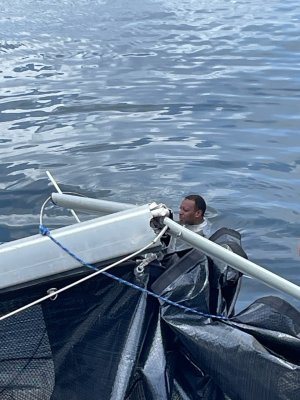Rum_Pirate
Well-known member
Figures are rounded for this discussion
Vessel bought for 10K.
New owners put 11K in to make it sailable. New standing rigging, new mainsail (had none), new running rigging etc.
So total input is 21K plus minor incidentals.
Insured for 25k
Dismasted.
Requires (Boat Yard Estimate):
The Insurance's Marine surveyor indicates 35K.
Insurance usually pay out on the insured value less the residual value as they don't want to have a 'wreck' on their hands and have to dispose of it e.g. sell or dump.
Insurance Co are offering 12.5K.
Sounds like it was calculated by sticking a finger in the air and it was determined "Offer them half" of insured value.
How do you respond given that it would cost at lease 25.5 for Boatyard to repair?
Secondly can one withdraw a claim and re submit e.g.
Would they pay out then?
Polite suggestions on how to proceed?
Vessel bought for 10K.
New owners put 11K in to make it sailable. New standing rigging, new mainsail (had none), new running rigging etc.
So total input is 21K plus minor incidentals.
Insured for 25k
Dismasted.
Requires (Boat Yard Estimate):
New Mast (cannot be spliced) 1
New mainsail (existing is less than 6 months old)
New standing rigging
New roller furling
New jib
Repairs to coach roof and hulls, new chainplate etc
Total 48K (i.e. more than insured value.The Insurance's Marine surveyor indicates 35K.
Insurance usually pay out on the insured value less the residual value as they don't want to have a 'wreck' on their hands and have to dispose of it e.g. sell or dump.
Insurance Co are offering 12.5K.
Sounds like it was calculated by sticking a finger in the air and it was determined "Offer them half" of insured value.
How do you respond given that it would cost at lease 25.5 for Boatyard to repair?
Secondly can one withdraw a claim and re submit e.g.
New Mast (cannot be spliced) 14K
New mainsail - repair half a dozen tears and live with repaired reduced life sail 1K
New standing rigging 1.25K
New roller furling 2.75K
New jib (I have a brand new unused one) 0K
Repairs to coach roof and hulls, new chainplate etc 2K
Total 21K (i.e. Claim would be LESS than insured value) with me doing the labour.Would they pay out then?
Polite suggestions on how to proceed?
Last edited:

